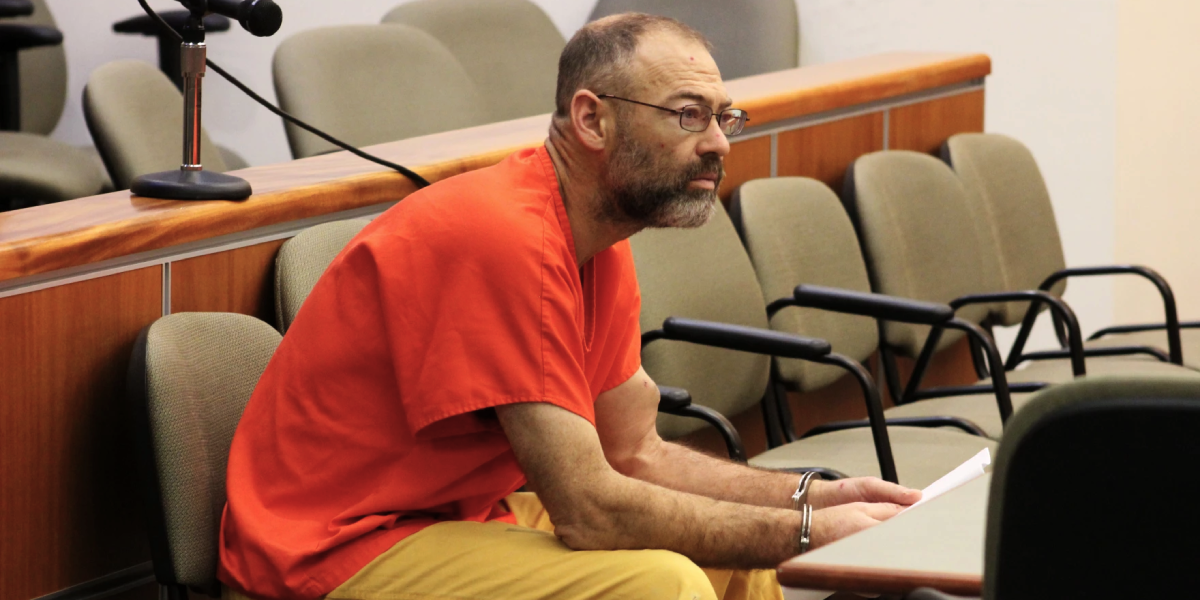More than 11 years revealing secrets because there is no excuse for secrecy in religion – w1997 June 1; Dan 2:47; Matt 10:26; Mark 4:22; Luke 12:2; Acts 4:19, 20.

Written and Published by: Miss Usato, Interviewed: Anonymous Survivors of Merritt and a Witness
The case of Former Jehovah’s Witness and perpetrator Scott Merritt is more than a criminal indictment — it’s a window into a global pattern of institutional cover-ups and the survivors fighting to bring truth to light. This in-depth article interviews survivors of abuse by Scott Merritt, who wishes to remain anonymous. Along with them is a witness who grew up with them, also remaining anonymous.
A Long-Awaited Indictment
On October 30, 2025, in Kenai, Alaska, a grand jury indicted 45-year-old Aaron “Scott” Merritt, a former Jehovah’s Witness from the Kenai Congregation, on 20 felony counts. Six counts of first-degree sexual assault, one count of second-degree sexual assault, four counts of first-degree sexual abuse of a minor, eight counts of second-degree sexual abuse of a minor, and one count of third-degree sexual abuse of a minor, ages 5 to 14. News reports say that it was 4 girls
Witness: “But there’s more. Definitely more.”
According to the Alaska Department of Law, the abuse occurred between 1998 and 2002, when Merritt served as a Ministerial Servant, a position of authority within the congregation. What some news reports are getting wrong is that Merritt was a Ministerial Servant, not an elder or “leader” in the Congregation. He has been a disfellowshipped Witness since 2002. If convicted, Merritt faces up to 99 years in prison.
The Investigation That Wouldn’t Die
“He refused any counseling or help. There have been more victims. He cannot be trusted. It went on for too long.”
– mother of one of the Victims
The Kenai Police Department first received a report of abuse in 2002, but lacked sufficient evidence to prosecute. Two decades later, new witnesses and corroborating evidence prompted investigators to reopen the case in 2021.
“This arrest is the result of persistence and determination,” said David Ross of the Kenai Police Department. “Even after two decades, we remain committed to pursuing justice and holding individuals accountable for their actions, no matter how much time has passed.”
Merritt pleaded not guilty during his arraignment on November 4, 2025, at the Kenai courthouse.
Superior Court Judge Jason Gist set bail at $250,000 cash and required a third-party custodian if Merritt were to be released. Until then, he remains in custody at the Wildwood Correctional Complex.
Experts, advocates, and civilians say Merritt’s case reflects a broader pattern within the Jehovah’s Witness organization, where institutional loyalty and image preservation often override victims’ welfare and legal obligations.
Several of Merritt’s victims and their family members attended the hearing, which was very triggering for their long-awaited justice. One mother pleaded for stricter bail conditions, stating:
“He refused any counseling or help. There have been more victims. He cannot be trusted. It went on for too long.”

The Silent Years: Kingdom Hall Cover-Up and Neglect
“He said, ‘I’m sorry about whatever it is that you think I did.’ That was it. Then they told us not to talk about it anymore.” -Survivor
So, how does this happen? How does a perpetrator, a pedophile, get away with not one, but multiple grotesque acts like this, especially in a place of worship? According to one of the survivors, the Jehovah’s Witness organization took no disciplinary or legal action when allegations first surfaced.
Survivor: “The only thing that ever happened to him was being removed as a Ministerial Servant in 2001. No one called the authorities. He wasn’t even disfellowshipped until later, and it was only because of marijuana or dating outside the Organization, not because of the abuse.”
This selective enforcement highlights a troubling pattern within Jehovah’s Witness congregations: the “two-witness rule.” Under this internal doctrine, allegations of wrongdoing, including sexual abuse, require two witnesses before elders can take action.
Jehovah’s Witnesses have a judicial system that runs parallel to secular law. It is a pretend law made from their own theocratic jurisdiction.
According to their doctrine (based on Deuteronomy 19:15), no accusation, especially one as serious as sexual assault, can be acted upon by elders unless there are two witnesses to the same act.
Think about that: the only “witnesses” to child sexual abuse are almost always the abuser and the victim. So when a child reports what happened, elders will often say there’s “insufficient evidence” to take action. Typically, with these instances, there was no 2nd witness, and the abuse is covered like it never happened. But, in some cases:
Survivor: “I even had a second witness when I was abused, and still, nothing happened.”
One survivor recalls going with a friend, aware of the abuse, to report it. It was to a Jehovah’s Witness that they trusted at first, another ministerial servant of the Kenai Congregation in 2001. He was also a firefighter and thus a mandatory reporter under state law.
Survivor: “To my knowledge, it didn’t happen,” she said. “We told him about it, expecting him to report it, and he never did. Instead, he went to one of the victim’s fathers about the allegations.”
When Merritt was eventually confronted by the elders, he was told he had to apologize to the victim. His “apology” only deepened the wound:
Survivor: “He said, ‘I’m sorry about whatever it is that you think I did.’ That was it. Then they told us not to talk about it anymore.”
Again, no judicial committee was formed, and no report was made to law enforcement. This hollow Apology was the only action (and by force from the elders) that the survivor had.
Jehovah’s Witnesses are instructed to report wrongdoing internally, to the congregation elders, before contacting authorities. These elders are not trained investigators or social workers; they are spiritual overseers who answer to the Watch Tower Bible and Tract Society, the governing organization in New York.
The elders, in turn, are required to call the organization’s Legal Department, not law enforcement, when they receive a report of abuse.
That legal team’s priority is clear: protect the organization’s interests, not the child’s. Many internal letters show elders being advised not to report crimes unless “required by law.”
This is how mandatory reporting laws are sidestepped: elders convince themselves that their duty to Jehovah outweighs their duty to the state.
Systemic Failure and Generational Trauma

Merritt’s father, who served as Secretary of the Kenai Congregation, helped suppress discussion of the abuse. This was confirmed by multiple Victims.
Survivor: “With Merritt’s dad being one of the main elders, they kept it very quiet. It would have caused drama and forced his father to step down as an elder, so they were protecting themselves.”
Even worse, Merritt’s mother reportedly spread rumors that the victims were “liars” and “deceitful” and not to listen to them.
Survivor: “The elders told us not to bring reproach against Jehovah, so it stopped getting talked about.”
Survivors described a culture of silence and fear in the congregation.
Survivor: “It was scary; nothing was being done anyway. Of course, I didn’t want to speak up.”
Many Jehovah’s Witness families were unaware their children had been abused, as elders failed to inform parents, even after reports were made by the victims themselves.
Survivor: “We kids would talk among ourselves, like, ‘Did you hear so-and-so was touched by him?’ But the elders told us not to talk about it.”
One survivor expressed that there was not a lot of trust between the children and adults, and that’s when she was questioned once by the Congregation Elders.
Survivor: “I was asked about any sins I have committed, instead of the abuse. They wanted to know terrible sexual details about OTHER situations, but of course, when it came to Merritt…they didn’t want to know.”
The Kenai Congregation has since been sold, and the congregants spread to other Kingdom Halls. Merritt never went back to being a Jehovah’s Witness after he was disfellowshipped, but he did join other religious communities around the town of Kenai for the next 2 decades.
Witness: “He just got away with it all for so long, just like what happens all of the time in this Organization.”
This man is a pedophile who got away with multiple acts of abuse on multiple children in the Jehovah’s Witness Organization; who’s to say he didn’t do the same to other communities? The Kenai Police Department urges anyone with additional information to contact them at 907-283-7879.
Survivor: “I am worried he continued this in other communities. This is what happens when predators go unreported—when those trusted to protect instead choose silence.”
A Culture of Image Management
At the organizational level, Jehovah’s Witnesses prize their reputation for “moral cleanliness.” Reports of abuse threaten that image. So internal correspondence often stresses confidentiality, privacy, and the avoidance of “worldly courts.”
The result? The religion has functioned as a refuge for predators, with secrecy enforced not only by policy but by theology.
A 2019 Australian Royal Commission found that the Jehovah’s Witness organization kept a database of over 1,000 alleged abusers—and turned none of them over to authorities.
The Bigger Picture
When you step back, it’s not just about one man or one congregation.
It’s about a global pattern of structural insulation, religious courts replacing civil ones, loyalty valued above legality, and forgiveness weaponized against justice.
It’s a blueprint for silence.
And like all blueprints, it can be traced, documented, and dismantled.
Other links about this Topic:
KDDL: Former Church Leader in Kenai pleads not guilty to child sexual abuse
ADN: Kenai Church Leader indicted on sexual accounts with minors
Kim Mikey: Jehovah’s Witness Arrested in Kenai, Alaska for CSA
Watching Watchtower: Jehovah’s Witness charged with sexual abuse crimes